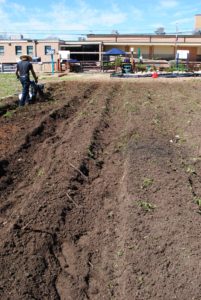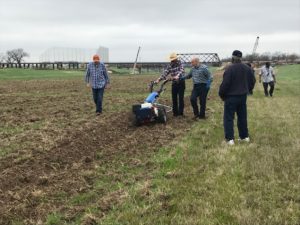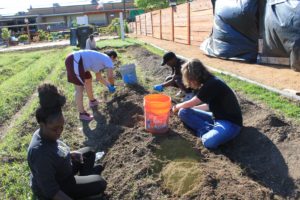Grow Southeast: Fighting Food Insecurity, One Farm at a Time
June 4, 2019 • community
School of Public Health & Texas Center for Health Disparities Community Blog
Linda Fulmer, B.S.W., M. Ed.
Executive Director, Healthy Tarrant County Collaboration
 In 2014 we met with the community leaders in East and Southeast Fort Worth to ask what they thought could help make their neighborhoods healthier. They pointed out that while many organizations offer nutritional and cooking classes, there were not enough stores nearby selling healthy food.
In 2014 we met with the community leaders in East and Southeast Fort Worth to ask what they thought could help make their neighborhoods healthier. They pointed out that while many organizations offer nutritional and cooking classes, there were not enough stores nearby selling healthy food.
East & Southeast Fort Worth covers about 72 square miles, and today has only four supermarkets to serve its large population—not nearly enough. There are over 100 convenience and dollar stores in the area, but most of these stock beer, wine, lotto tickets, unhealthy snacks, and pretty often, gaming tables. The region has a high percentage of low-income families, along with high rates of obesity and chronic diseases.
In 2016, our Plan4Health grant allowed us to test retail strategies for expanding healthy food access in the area. More about our array of healthy food access work was recently posted on Moving Health Care Upstream’s Examples in Action site.
During Plan4Health we met some residents who owned land they wanted to farm. They believed that urban farms could help their neighbors gain new job skills, and also expand healthy food access. So, what was stopping these future urban farmers?
- Their land was zoned for residential or commercial uses; not agricultural.
- They had plenty of land and passion but lacked the means and structure to turn those into productive urban farms.
We started meeting monthly to share information and resources. Over time more people joined in, either to start their own farms, or to offer technical assistance and support. Today this project is known as Grow Southeast.
To address the land use issue, we encouraged the future urban farmers to put the City of Fort Worth’s Urban Agriculture Ordinance into practice. This allows urban farms to exist on land zoned for residential or commercial uses. While the process has been slow at times, together we worked through the challenges, providing feedback to the City to help improve the ordinance.
We also applied for grants seeking seed money for start-up costs. We received a small grant for equipment, which helped us buy a BCS 739 2-wheel tractor with a rear tine tiller and rotary plow attachments. This powerful and versatile tractor is available for any of the farmers to borrow.

Would you like to be a Grow Southeast urban farm volunteer? We are always looking for more people to share their time and talent at one or more of the farms. If you are interested, please contact me at LindaFulmer@sbcglobal.net or 817-451-8740.
Research reported in this publication was supported by the National Institute On Minority Health And Health Disparities of the National Institutes of Health under Award Number U54MD006882. The content is solely the responsibility of the authors and does not necessarily represent the official views of the National Institutes of Health.


Social media